Why the World is Doing Better Than You Think, According to Steven Pinker

Just over a year ago, the Harvard professor and cognitive psychologist Steven Pinker, doubling down on his previous research, claimed that by almost every metric of human wellbeing, the world is getting better-everything from war, violence, and poverty (all declining) to health, wealth, happiness, and equality (all improving).
That claim, the basis for Enlightenment Now, has since cast Pinker in the role of Starry-Eyed Academic Optimist and corralled some historical, statistical, and generally pessimistic criticism. Pinker insists, though, that his disposition is not really “optimism” but “progressivism,” and that it’s not found in the stars, but in verifiable earthly data.
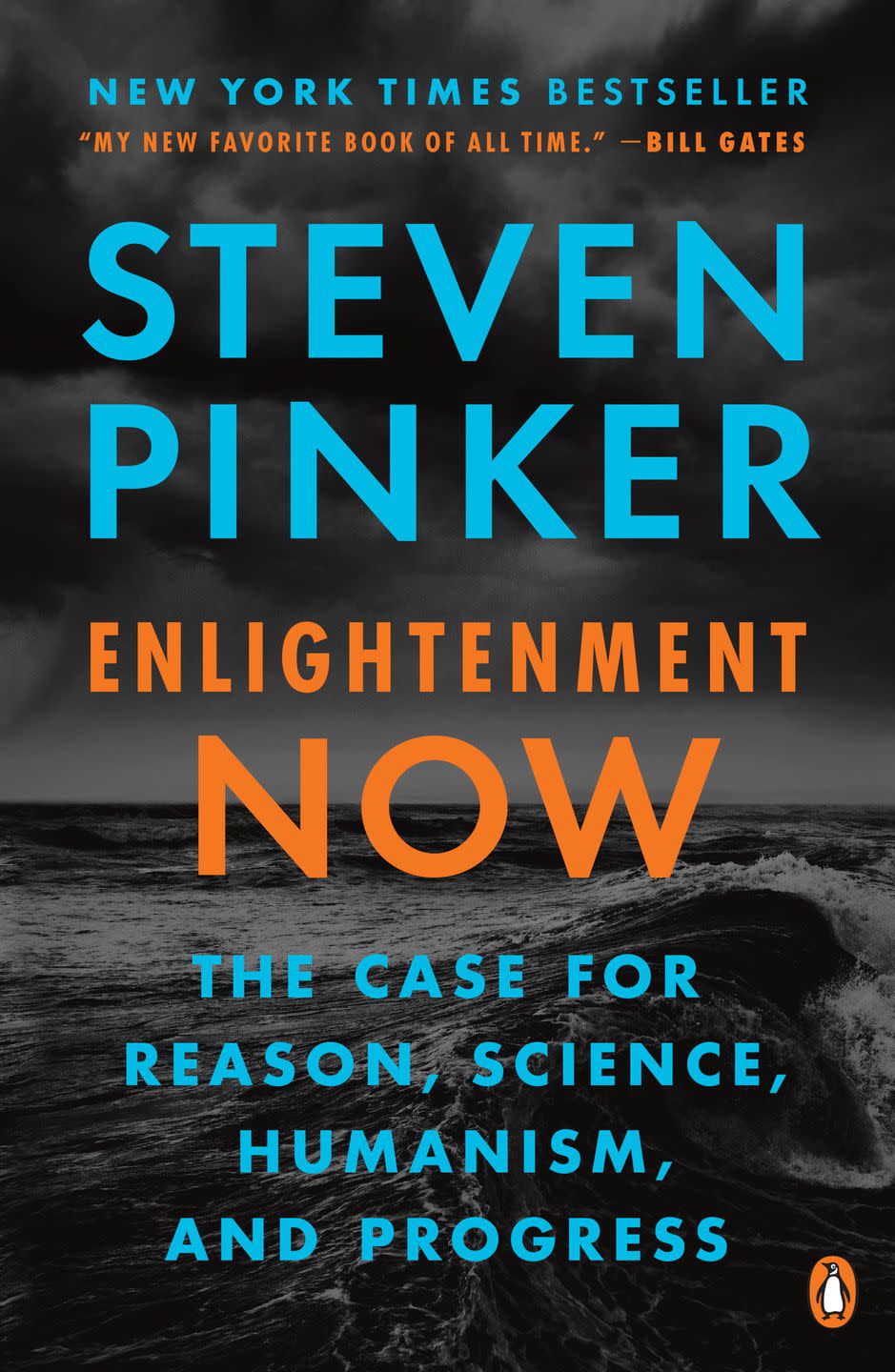
Still, for many, scenes from the past year, including the killing of journalist Jamal Khashoggi, the bombing of a Yemeni school bus, and the disconcertingly threatening Twitter exchange between the nuclear armed North Korea and the nuclear armed United States, all seemed to portend growing violence and instability. So far, 2019 has been marked by terror attacks, contested elections, and fallen airplanes.
Assuming his earthly data is sound, we asked Pinker why "progress" appears absent. And why, though for most of us it looks like the end of the world as we know it, does Steven Pinker feel fine.

1) Because The World Isn’t As Dangerous as We Assume
If you travel to London, you might notice a bizarre absence of trashcans. Public squares, soccer stadiums, train stations-the bins have been long-consolidated or else removed from these places for fear of their use as bomb compartments.
These sort of preventative actions may seem reasonable, and it's almost impossible to wander among crowds now without envisioning some form of destruction. But these are exactly the kinds of assumptions Pinker’s work interrogates. “We’re biased toward negativity,” he tells me. We erroneously expect destruction.
To understand why, you need only make two lists: one of every glorious thing that could transpire on a typical day, and the other of every bad, nasty inconvenience. Pinker suspects your latter list will be longer; since these include the things that can actually hurt us, it makes sense for our emotions to be tuned toward the negative, says Pinker. Essentially, we’re wired for pessimism.
This hardwiring, however, makes for terrible risk calculation.
The odds, for instance, that an American will die in a terrorist incident is about 1 in 3.3 million. Yet of all 2016 campaign issues, a majority of voters on both sides said “terrorism and national security” was their largest concern. The list of things more likely to kill Americans, however, fills up notepads and includes everything from a flight of stairs to a swarm of bees. (Bees kill more Americans every year than do ISIS, sharks, scorpions, alligators, bears, and airplanes combined).
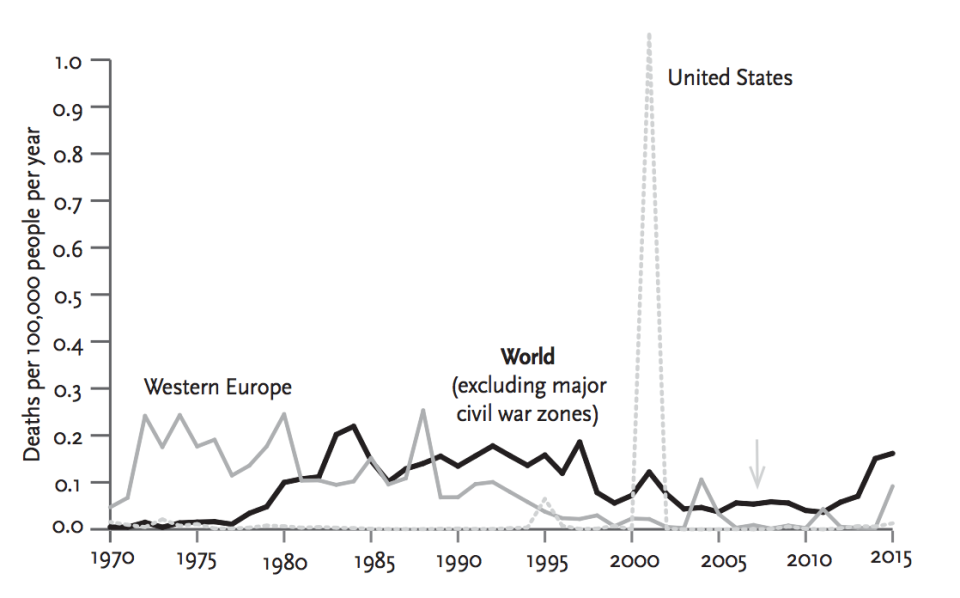
Even with garbage cans, Europe isn’t any more dangerous. Though the continent has borne several deadly attacks over the last decade, in general, terrorist incidents in western Europe (both in frequency and lethality) have been declining since the 70s and 80s-an era that saw a high of almost 10 attacks every week, many by the IRA. (Even then, trashcans weren’t explicitly removed until the early 90s, and attacks still persisted afterwards).
In general, our personal danger calculation has more to do with instinct and optics than reason and logic, notes Pinker. Someone intending us harm causes more worry than something that buzzes and doesn’t. Danger can be difficult to accurately cognize. And so too can "progress."

2) Because Progress Marches Unnoticed
To understand what Pinker means by "progress," it's useful to picture a thought experiment used by the American political philosopher John Rawls. Rawls's test has to do with introducing a law, but there's a helpful sci-fi alternative involving time travel and spontaneously-generating babies. It goes like this: You enter a time machine that will spit you out as a random newborn at a random location during a particular moment in human history. You know nothing about who you will be-your social status, class, race, intelligence, nationality. The decision you must make is simply the year.
Pinker says you should chose this year, or, at least a year close to the present; the more recent the date, he reasons, the better your chance at a favorable birth lottery. Thus: progress.
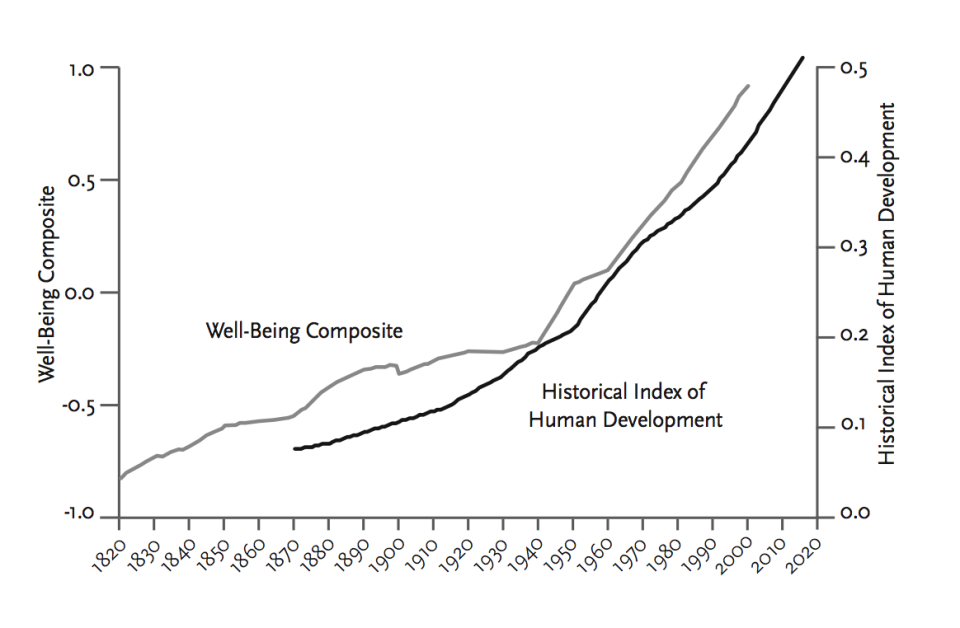
The problem, Pinker tells me, is that we’re ill-equipped to conceptualize this progress. We notice maladies like we do curbed trash bags: when they smell, not after they’ve been slowly collected. Since we’re also hardwired for nostalgia, Pinker points out, we’re likely to assume things were better before, even when the garbage smelled worse. And so a decades-long decline in violent crime passes by noticed when all we see on the daily news is smelly evidence of violence and crime.
For this reason, one of Pinker’s progressivist gripes remains news media, the culprit, he says, for much of our negativity biases. News tends to conspire with another cognitive lapse called the “availability bias”; we believe what we see most often, what’s available. Since news leads often bleed, we tend to think of the world as a perpetually gaping wound. Pinker slings data to suggest that wound is constantly healing, not widening.
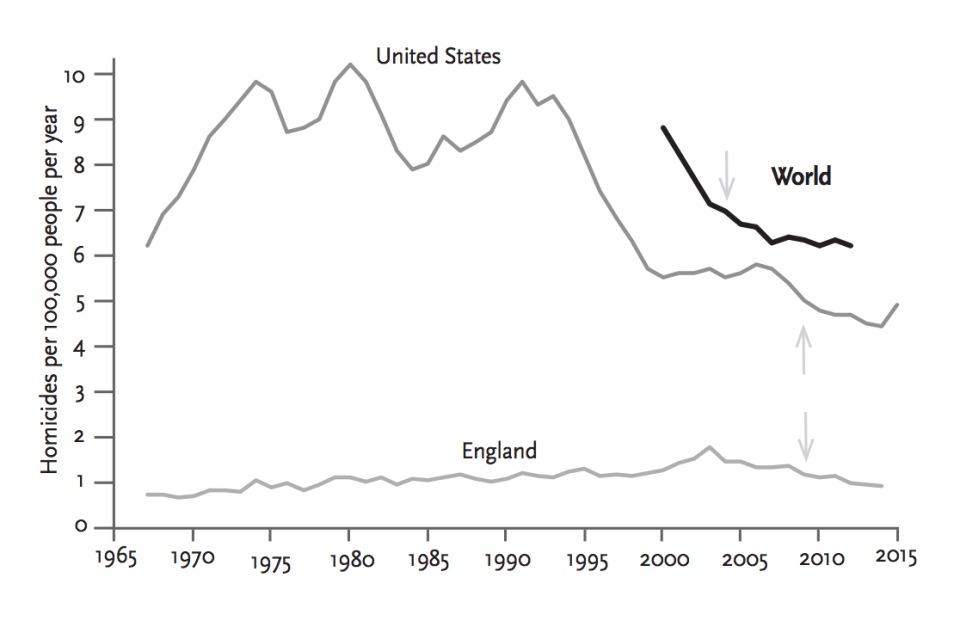
' expand='' crop='original'][/image]
The issue, of course, is that “progress” can’t just be about less violence and crime. Pinker must also answer the modernist challenge that recent luxuries, while making our lives easier and longer, have simultaneously made us more anxious and depressed. In other words: If you enter “2018” into the time machine will you actually grow up happier?

3) Because Our Neighbors Are Happier Than We Think
Pinker says that most of us underestimate the number of other happy Americans by about 40 percent. When it comes to our compatriots, since we obviously can’t peer into their minds, we make assumptions based on what’s visible to us, Pinker tells me. Since those visible are those on the news who suffer, the general picture of our countrymen tends to be pretty bleak.
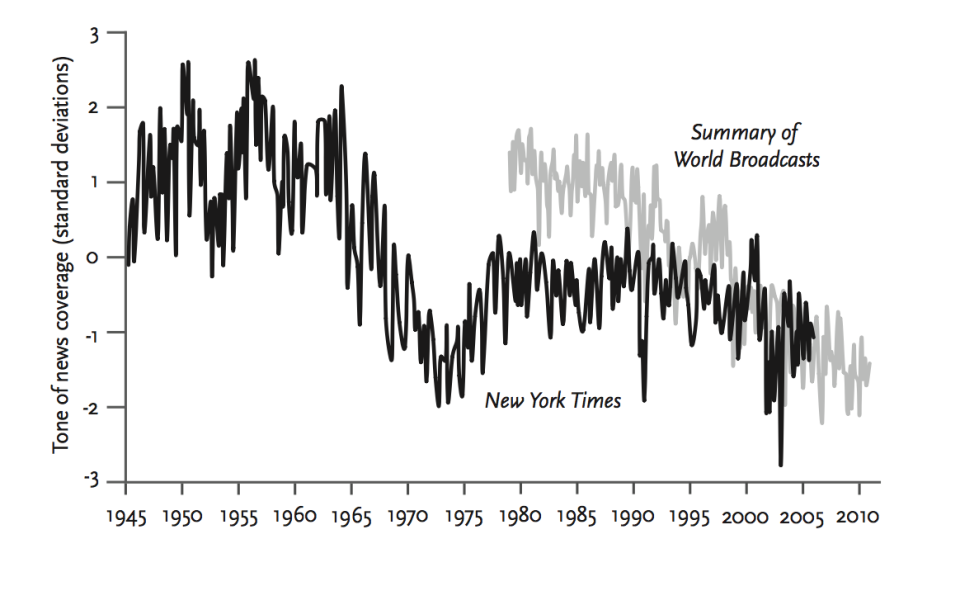
Bleak enough to think ourselves part of some Great Malaise, a loneliness or mental health “crisis.” I ask Pinker if there’s any merit to this assessment. While he admits slight dips in American happiness scores (the world has gone up) and upticks in suicide rates (the world has gone down), neither of these metrics, Pinker tells me, warrants the term “crises.” For one, the starting point of American happiness was already quite high, he notes. And, according to his data, mental illness rates (including depression and anxiety) have been generally flat for the last 25 years, Pinker says.
As for U.S. suicide rates, Pinker acknowledged increases over the last decade. But these increase, according to his data, came after an all-time low, and is not indicative of the world as a whole.
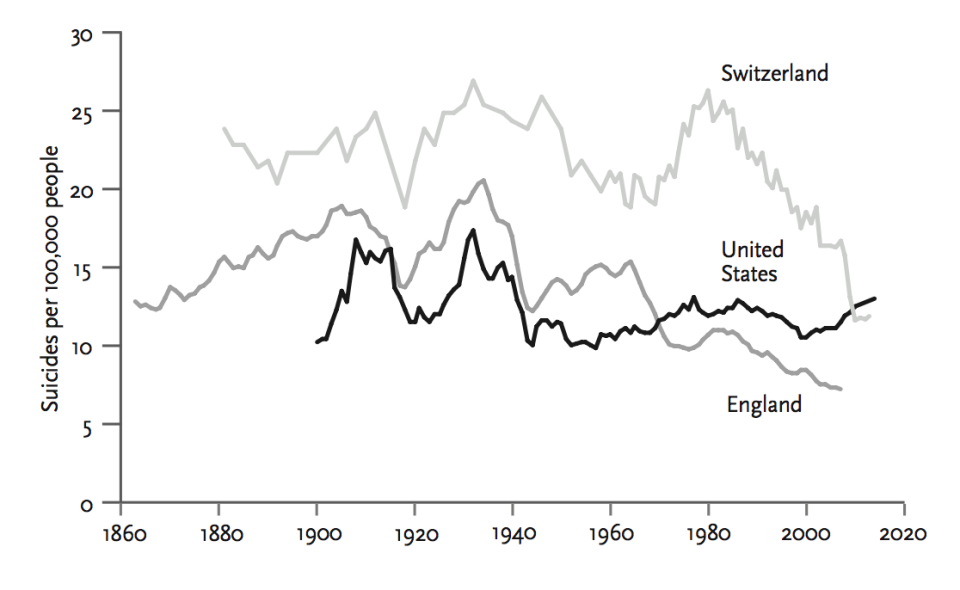
Still, Pinker believes the American data is cause for concern and that it speaks to a weaker safety net; too many of us fall through the healthcare cracks, particularly rural less-educated, middle-aged white men, Pinker tells me.
But again, Pinker believes we should exercise caution when labeling data trends “crises” or “epidemics," as this sort of alarmist-sounding news has adverse effects on our psychology, adding unnecessary worries, he says, to our own personal worry list. Negative news doesn't just convey a warped worldview; it also turns us into the unhappy people would-be time travelers assume us to be.

4) Because Ignorance Isn’t Bliss
Part of Pinker’s “optimism” then entails using data to relieve burdensome biases. It means reminding yourself that trashcans or no, visiting Western Europe is something fun you should do, and not something dangerous you should avoid. It entails making a conscious effort to worry about the things worth worrying about.
Pinker tells me that since researching the book he’s changed quite a few of his behaviors and attitudes. He’s now more positive about the possibility of change. He donates more to charity. He’s more interested in politics, less jaded. “As a cognitive psychologist, I've always tried to be aware of the greatest risks to the health and safety,” he says. “So I exercise. I try to maintain health healthy lifestyle, knowing that heart disease and stroke are much bigger killers than terrorism and crime. I wear a seat belt. I take statins. I look at what what are objectively the biggest threats.”
Pinker is not dismissive of things like terrorism or violent crime; he just thinks the attention given to some of these issues may not be proportionate to the threat. And despite characterizations of starry-eyed optimism, Pinker does worry, particularly about opioid overdoses (a real “criss,” Pinker says), nuclear weapons exchanges, and climate change - as these are either high risk, high probability, or both.
Still, Pinker doesn’t let those things lead him to apathy or pessimism. That’s because what Pinker really means by “progressivism” is something closer to how physicist David Deutsch understands “optimism” - that all failures and all evils result from insufficient knowledge. Bliss is having this knowledge. And, without peering into his brain, Pinker seems, at least visibly, quite blissful indeed.
('You Might Also Like',)

